#2024UMMCGrad: Estelle Blair balances medical school and motherhood – single, but not alone
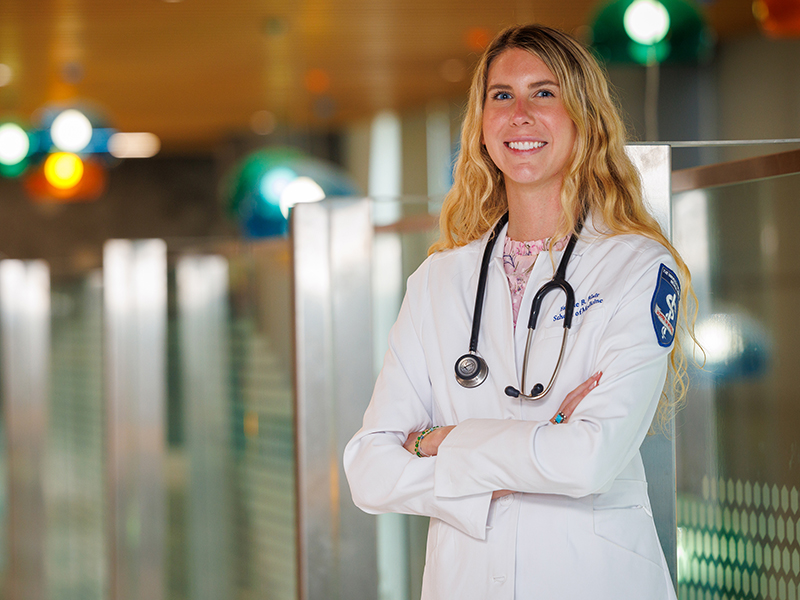
It’s easy to take your breath for granted, until your child loses hers.
Estelle Blair will never take it for granted again. The day her daughter stopped breathing, she did, too.
As Lucy grew older, the febrile seizures that stole her breath faded away; the impact on her mom did not.
Her emotions will follow her throughout a career that begins after her graduation this month from the University of Mississippi Medical Center School of Medicine.
“We can forget sometimes in medicine, what it’s like discovering how fragile life is,” she said, “especially seeing this with someone we love.
“Whenever a child enters a hospital or pediatrician’s office, it can be scary for their parents. I can meet those parents where they are now.”
On May 24, Blair will be one of around 159 receiving medical degrees from UMMC, but probably the only one who will have graduated from high school, college and medical school, as a single parent.
Brought up in Flowood as one of four children, she was still in high school when she learned she would be a mom – single, but not alone.
“I have this incredible family with these incredibly strong women,” she said. Namely: Anne Salvo, her mom, and Allie Blair and Rachel Blair, her sisters.
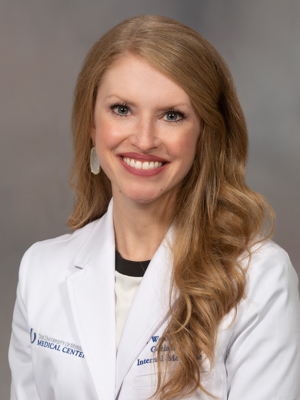
They told her that, no matter what, she should, and could, get an education. Rachel was the first to tell her she could become a doctor. Among those who saw that happen was Dr. Lyssa Weatherly.
“What I find most amazing about Estelle’s story is her humility and selflessness throughout this journey,” said Weatherly, associate professor of medicine and assistant dean for student affairs in the School of Medicine.
“I’m thankful to have learned a little about motherhood from her, and I hope I can raise my own daughter and balance being a woman in medicine with the grace she has taught me along the way.”
The way wasn’t easy. “My daughter saw me fail more times than I can count,” Blair said. “But – I hope – she saw me get back up and try again. I needed her to see this; it’s what kept me going.”
While attending Hinds Community College, a scholarship came through for her. Blair moved in with Allie, in Oxford; she entered the University of Mississippi – and one of the most demanding times of her life.
Mornings at 6, she woke up and took care of Lucy. When the baby-sitter didn’t show up, Lucy went to class with her, at 8 a.m. After studying until 5 p.m., she had play time with her daughter. She needed those breaks – especially after that first test, on genetics.
“I did so badly, I thought I was going to fail the class,” she said. She called her dad, Bill Blair, who told her, “‘I would rather see you fail than see you give up.’
“We all want to believe we’re pretty tough – ‘pull yourself up by your own bootstraps’ is something we’re taught,” she said. “But some people don’t have bootstraps. I did: My family.
“And I understood it was a huge privilege to be able to go to college. It was important for me to always be there, to show up. Not many people get to be there. And many girls who get pregnant in high school don't finish.
“It was like I was representing them. So, I didn’t give up.”
While studying at Ole Miss, Blair did research on pediatrics and obesity. She worked on the marijuana farm there: “They offer health insurance,” she said. She volunteered with the local Boys & Girls Clubs and at a nursing home. She tutored college students, as well as high school kids taking the ACT.
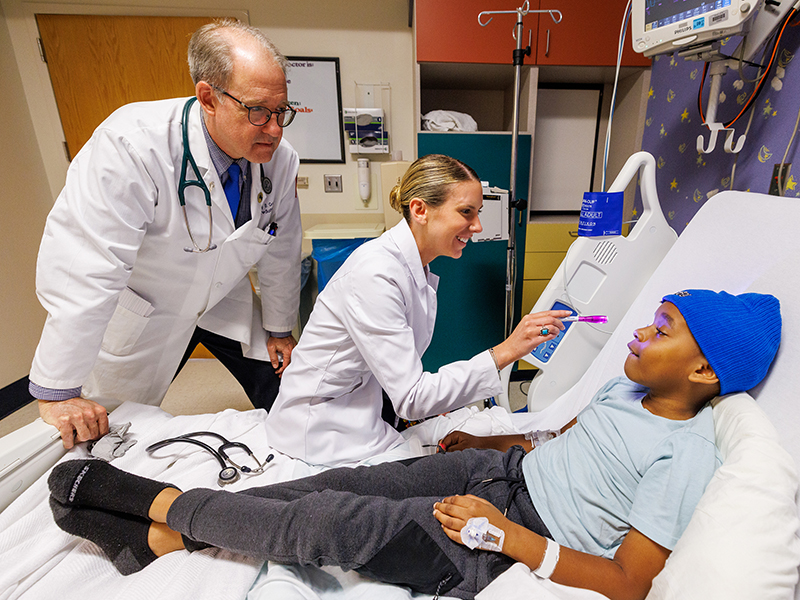
Along the way, she, too, was being tested. One test had a single question: How badly do you want to be a doctor?
Medicine had always captivated her. Pandemics fascinated her: She saved Newsweek issues that covered the Zika virus.
Obviously, her own daughter’s medical condition riveted her most of all. “Starting around age 2, Lucy would get sick and spike a fever,” Blair said. “Kids’ brains have a lower seizure threshold than adults’, but they usually grow out of this.”
For Lucy, it lasted about three months, as she and Blair met frequently with physicians. There will be no long-term effects, physically, for Lucy, who is 11 now; but those seizures will always affect Blair. They would even influence her choice of specialties.
“I realized that, in taking care of a child, you get to take care of the family, too,” she said. “There’s nothing else like it, to take care of those who have no voice.”
For about six months, while working, attending class and taking care of Lucy, she studied for the Medical College Admission Test. It paid off.
“I remember the acceptance letter,” she said. ‘I’m a crier, so I cried.”
On the first day of medical school, she and her classmates sat six feet apart and wore a mask. During those first two years of COVID, “we just kind of winged it, and we got through it,” she said.
“The administration made sure we got to the finish in a timely fashion, which I am extremely grateful for. And I’m so thankful for those online courses – because I was able to homeschool Lucy.”
During Blair’s four years of medical school, Weatherly never heard her complain. “Most medical students have one job: being a medical student,” Weatherly said. “Estelle has been a medical student, pandemic home-school teacher, researcher, advocate, caregiver, volunteer, and, most importantly, mother.
“And she has worn each hat with unwavering grace.” Soon, she’ll be wearing one more: pediatrics-neurology resident – at UMMC.
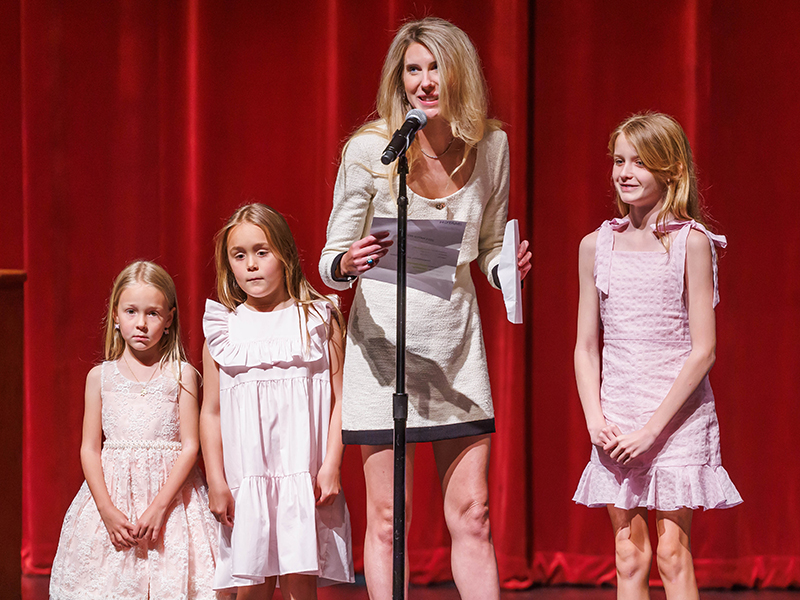
“I decided to stay in Mississippi,” Blair said. “I love Mississippi – the literature, the music – but we also have to grapple with our history. I want to work on letting people in who have been left out. To do that, I don’t have to go overseas.”
She chose pediatrics-neurology, not only because of Lucy, she said, but also because of her fascination with the brain. “The brain and children, and their relationship with their parents.”
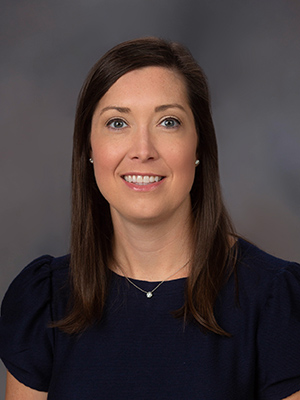
To her specialty, Blair brings “empathy, compassion and her experience as a single mother,” said Dr. Austin Harrison, associate professor of pediatrics. “I can think of no better field for her.”
On March 15, Blair announced that decision to hundreds of people attending the medical school’s Residency Match Day . With her were Lucy, along with Ellerie Adair, 7, and Quinn Adair, 6, the daughters of her partner, Mark Adair.
“I got to go up on stage with three little girls,” Blair said, “and I hope they now believe they also can do whatever they want.”
It was one of the happiest days of her life; she will carry it with her always, as she will the saddest: the day her best friend from high school, while recovering from addiction, died from an overdose, alone.
“The question comes up, then: Was there anything else I could have done?” she said.
“So, in my medical practice, I will always have that question about my patients: Is there anything else I can do?” And try to help their parents catch their breath.


